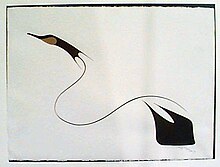| Revision as of 18:51, 9 December 2023 editJoan arden murray (talk | contribs)Extended confirmed users37,284 edits →Career← Previous edit | Revision as of 18:51, 9 December 2023 edit undoJoan arden murray (talk | contribs)Extended confirmed users37,284 edits →Early lifeNext edit → | ||
| Line 24: | Line 24: | ||
| ]] | ]] | ||
| His first exhibition, held after his move to Ottawa, featured abstract compositions of block-stamped geometric motifs. By 1976 his work had changed to modern linear representations of birds and animals, accompanied by a sense of humour and movement.<ref name="Phillips" /> | |||
| ==Career== | ==Career== | ||
Revision as of 18:51, 9 December 2023
| This article may be in need of reorganization to comply with Misplaced Pages's layout guidelines. Please help by editing the article to make improvements to the overall structure. (February 2022) (Learn how and when to remove this message) |
| Benjamin Chee Chee | |
|---|---|
 | |
| Born | (1944-03-26)26 March 1944 Temagami, Ontario, Canada |
| Died | 14 March 1977(1977-03-14) (aged 32) Ottawa, Ontario, Canada |
| Education | Self-taught |
| Known for | Painting |
| Movement | Woodland School of Art |
Kenneth Thomas Benjamin Chee Chee (26 March 1944 – 14 March 1977), known as Benjamin Chee Chee, was an Ojibwa Canadian artist born in Temagami, Ontario. He is best known for his modern, simplified, and graceful depictions of birds.
Early life
Chee Chee's father died when he was young, and Chee Chee was separated from his mother and sent to residential school as a child. He later spent many years searching for her. He moved to Montreal in 1965 where he developed his love of drawing, and moved back to Ottawa in 1973.

Career
Chee Chee's first exhibition was held in 1973 at the University of Ottawa, featured abstract compositions of block-stamped geometric motifs. By 1976 he had gained recognition as he developed his style of clear graceful lines and minimal colour, depicting birds and animals. Though his art featured iconography often used by Canadian First Nations artists, Chee Chee denied his art had symbolic meaning. He instead referred to the animals featured in his art as "creatures of the present". He also specifically referred to himself as an Ojibway artist, as opposed to allowing himself to be categorized under the broader net of simply an "Indian" artist.
Death
After finding his mother and achieving success as an artist, Chee Chee died by suicide in an Ottawa jail in 1977. He was buried in Notre Dame Cemetery in Ottawa, Ontario. Chee Chee's work has been exhibited posthumously throughout Canada.
Legacy
Chee Chee has been mentioned in Canada's Parliament & House of Commons by MP Robert-Falcon Ouellette in a tribute to the artist about his influence.
Ouellette said "Let us also recognize one of the finest artists of Canada, Benjamin Chee Chee. He always refused to be an indigenous artist; he was a proud Anishnabeg. He drew simple lines, usually acrylic on paper. Highly influential in his time, he said he did not paint the past but the present, the living of today. We can see his works, like the flock of four geese. They represent the four directions of the unborn, the youth, the adults and the elders all moving in the same direction. Even though he died in tragedy and is buried in Ottawa, far from his land and people, he still inspires today." https://openparliament.ca/debates/2019/5/2/robert-falcon-ouellette-3/only/
Anthony Rota, Speaker of the House of Commons and Member of Parliament (Nipissing–Timiskaming) announced that the Government of Canada is investing $97,200 in the Temiskaming Art Gallery to support its exhibit of the work of Ojibwa artist Benjamin Chee Chee. Mr. Rota made the announcement on behalf of the Honourable Pablo Rodriguez, Minister of Canadian Heritage and Multiculturalism. The investment was made through the Access to Heritage component of the Museums Assistance Program, will allow the "Benjamin Chee Chee: Life and Legacy Tour" to travel to communities throughout Northern Ontario over the next three years. This funding promotes collaboration in the preservation of Indigenous culture and helps support the Government of Canada's commitment to reconciliation.
There is a park named after him (Benjamin Chee Chee Park) in Milton, Ontario.
References
- ^ "Find-a-grave site". Archived from the original on 12 April 2019.
- ^ "Native artist Benjamin Cheechee". www.native-art-in-canada.com. Archived from the original on 12 April 2019. Retrieved 1 January 2019.
- ^ Phillips, Ruth B. "Benjamin Chee Chee". www.thecanadianencyclopedia.ca. Retrieved 10 October 2020.
- Evans, Al (2004). Chee Chee: A Study of Aboriginal Suicide. McGill-Queen's Press - MQUP. ISBN 978-0-7735-7178-5.
Sources
- Evans, Alvin L. (2004). Chee Chee: A Study of Aboriginal Suicide. McGill-Queens University Press. ISBN 978-0773526877.
- Lerner, Loren R.; Williamson, Mary F. (1991). Art and Architecture in Canada. U Toronto Press. ISBN 978-0802058560.
- Matuz, Roger (1998). St. James Guide to Native North American Artists. The University of Michigan. ISBN 978-1558622210.
- "Native artist Benjamin Chee Chee". www.native-art-in-canada.com. 2006.
External links
Categories:- Ojibwe people
- 1944 births
- 1977 suicides
- 1977 deaths
- First Nations painters
- Artists who died by suicide
- Suicides by hanging in Ontario
- Canadian people who died in prison custody
- Prisoners who died in Canadian detention
- People who died by suicide in prison custody
- Artists from Ontario
- 20th-century Canadian painters
- Canadian male painters
- Woodlands style
- People from Temagami
- 20th-century Canadian male artists
- Burials at Notre-Dame Cemetery (Ottawa)